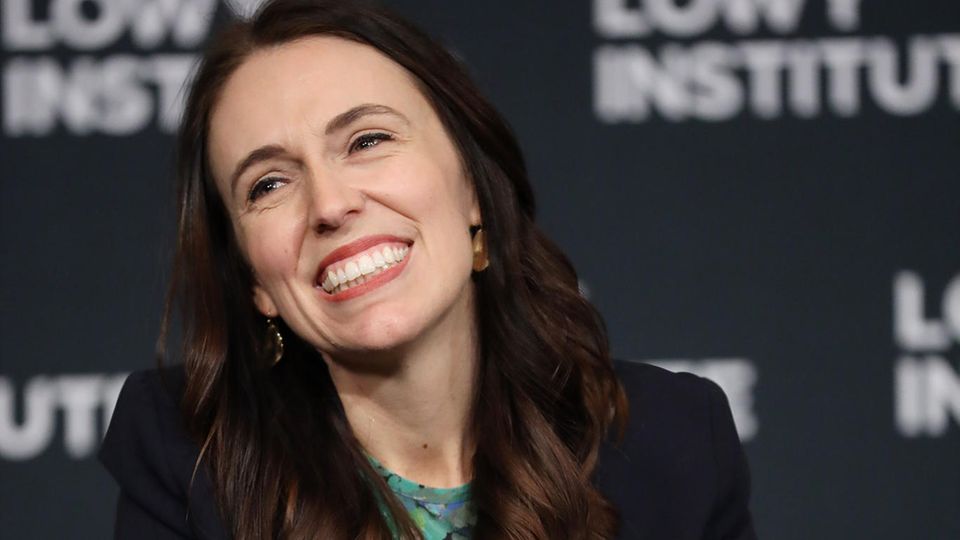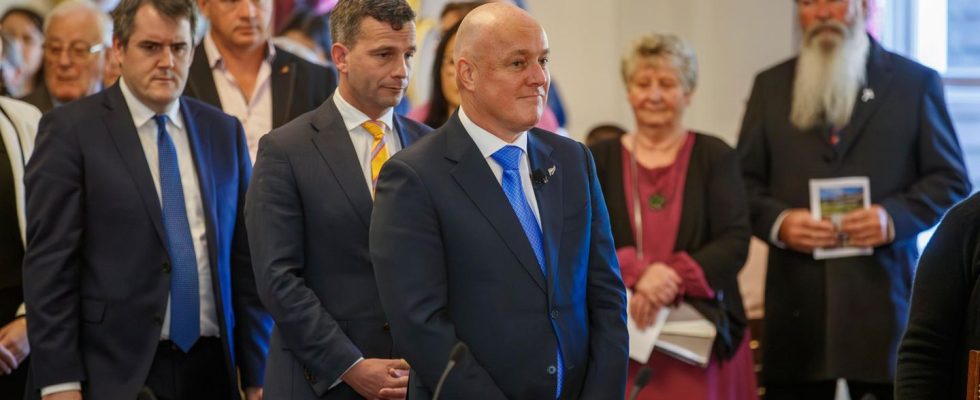Heir to Jacinda Ardern
Outcry in New Zealand: New government wants to overturn smoking ban
Christopher Luxon (in front) was officially sworn in as New Zealand’s 42nd prime minister on Monday and said his top priority was improving the economy
© Mark Mitchell/New Zealand Herald via AP/DPA
As soon as the conservative government in New Zealand was sworn in, criticism began to pour in. She wants to overturn the strict anti-smoking law. But why?
At the end of last year, the Pacific state, under the leadership of Labor leader Jacinda Ardern, passed a groundbreaking law banning smoking for people born after 2009. Tobacco may no longer be sold to them for life. This means that young people should no longer be tempted to start smoking. A reduction in the nicotine content in cigarettes and a smaller number of tobacco sales outlets are also anchored in the law. The country should be largely smoke-free by 2025. Smoking is the leading cause of preventable death in New Zealand.
Great Britain recently announced that it would like to follow New Zealand’s example and make future generations “smoke-free”. The British BBC spoke of a “shocking turnaround” in the Commonwealth country.
Maori in New Zealand are particularly affected
National Maori health organization Hapai Te Hauora called on the new government to reconsider repealing the laws. New Zealand is recognized internationally as a model for its pioneering efforts to curb tobacco consumption, said interim chief executive Jason Alexander. “We cannot allow our most vulnerable to pay the price of tax cuts to satisfy our country’s wealthiest and line their pockets.” New Zealand’s indigenous people have a higher smoking rate than the rest of the population and are particularly prone to tobacco-related illnesses.
The New Zealand Asthma and Respiratory Foundation also condemned the announcement. “This move not only undermines the progress we have made as a country in protecting respiratory health, but also places greater strain on our healthcare system,” the foundation said. Luxon’s National Party said it would remain committed to reducing smoking rates and keep all other rules in place.
Shocking images before the BGH
Where a pack costs 24 euros and some people smoke 3,000 butts – 14 facts about cigarettes
Australia, meanwhile, announced a timeline for its “vaping crackdown” announced in May. In a first step, the import of disposable e-cigarettes into Australia will be banned from the beginning of 2024. Later, among other things, flavors will be limited and the maximum permissible nicotine content reduced.
Jacinda Ardern unexpectedly resigned in January
Christopher Luxon, the 53-year-old leader of the conservative National Party, spoke to journalists on Monday after taking the oath of office about an “honor and great responsibility.” His most important task is to “put the economy in order.” “We need to lower the cost of living and get inflation under control so we can lower interest rates and make food more affordable,” Luxon said.
The National Party announced on Friday – six weeks after the election – that it would form a three-party coalition with the liberal ACT party and the populist New Zealand First party. In the parliamentary elections in October, the center-left government that had been in office for six years was voted out. Labor leader Chris Hipkins, who replaced his party colleague Jacinda Ardern as head of government in January, who unexpectedly resigned, admitted his defeat on election evening.

Hipkins had recently been under heavy pressure due to New Zealand’s increasingly poor economic situation. The former aviation manager Luxon has announced, among other things, a ban on cell phones in schools, tough action against criminals and the cancellation of planned tax increases on fuel as an immediate program for his first 100 days in office.

